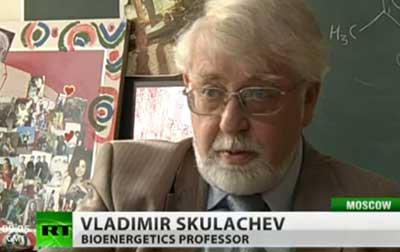 “A Russian scientist named Vladimir Skulachev says he’s come up with an anti-aging drug. Inhuman Experiments discusses it: VIDEO
“A Russian scientist named Vladimir Skulachev says he’s come up with an anti-aging drug. Inhuman Experiments discusses it: VIDEO
It appears that Skulachev has synthesized a mitochondrially targeted antioxidant. There’s no detailed information in the article, but based on the papers Skulachev’s group has published in the past, it looks like the compound in question is SkQ1, an antioxidant attached to a positively charged ion. Experiments have shown that SkQ1 prolongs the lifespan of a variety of species, including mice.
Clinical trials on humans are underway, and if everything goes smoothly, the drug will be out in a few years. After successful results from animal studies using eye drops, Skulachev tried it on his own cataract. After six months, his cataract was gone.
So what’s the catch here? Well, looking at the lifespan data from mice, they’re not talking about an increase in maximum lifespan but in median lifespan. The oldest mice receiving the drug did not live longer than the oldest mice in the control group, they just had a squared mortality curve. In other words, the mice that got SkQ1 made it to old age more often than the control mice.”







To summarize if this is confusing:
When you breathe in oxygen, ultimately, some of it turns into free-radicals, which are harmful to body tissue. The damage from the oxygen free-radicals eventually causes you to show signs of aging.
At the moment, there are no anti-oxidants in the human diet that can effectively “catch” the oxygen free-radicals.
(However, birds, for example, have high amounts of Uric acid in them – which is a very effective anti-oxidant. High amts of uric acid in humans causes gout.)
Although the drug in the video acts as an anti-oxidant and works in mice, the human biochemistry is somewhat different. Therefore, we may come to find that this gentleman’s “life’s work” doesn’t work at all.
p.s
but wouldn’t it be nice if it did 🙂
Thank you for the summarizing, now I understand much better.